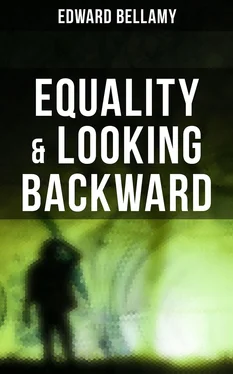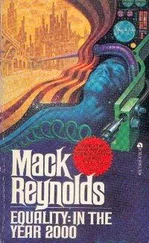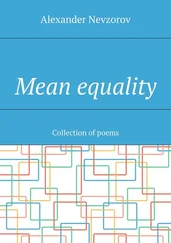Next morning I rose somewhat before the breakfast hour. As I descended the stairs, Edith stepped into the hall from the room which had been the scene of the morning interview between us described some chapters back.
“Ah!” she exclaimed, with a charmingly arch expression, “you thought to slip out unbeknown for another of those solitary morning rambles which have such nice effects on you. But you see I am up too early for you this time. You are fairly caught.”
“You discredit the efficacy of your own cure,” I said, “by supposing that such a ramble would now be attended with bad consequences.”
“I am very glad to hear that,” she said. “I was in here arranging some flowers for the breakfast table when I heard you come down, and fancied I detected something surreptitious in your step on the stairs.”
“You did me injustice,” I replied. “I had no idea of going out at all.”
Despite her effort to convey an impression that my interception was purely accidental, I had at the time a dim suspicion of what I afterwards learned to be the fact, namely, that this sweet creature, in pursuance of her self-assumed guardianship over me, had risen for the last two or three mornings at an unheard-of hour, to insure against the possibility of my wandering off alone in case I should be affected as on the former occasion. Receiving permission to assist her in making up the breakfast bouquet, I followed her into the room from which she had emerged.
“Are you sure,” she asked, “that you are quite done with those terrible sensations you had that morning?”
“I can’t say that I do not have times of feeling decidedly queer,” I replied, “moments when my personal identity seems an open question. It would be too much to expect after my experience that I should not have such sensations occasionally, but as for being carried entirely off my feet, as I was on the point of being that morning, I think the danger is past.”
“I shall never forget how you looked that morning,” she said.
“If you had merely saved my life,” I continued, “I might, perhaps, find words to express my gratitude, but it was my reason you saved, and there are no words that would not belittle my debt to you.” I spoke with emotion, and her eyes grew suddenly moist.
“It is too much to believe all this,” she said, “but it is very delightful to hear you say it. What I did was very little. I was very much distressed for you, I know. Father never thinks anything ought to astonish us when it can be explained scientifically, as I suppose this long sleep of yours can be, but even to fancy myself in your place makes my head swim. I know that I could not have borne it at all.”
“That would depend,” I replied, “on whether an angel came to support you with her sympathy in the crisis of your condition, as one came to me.” If my face at all expressed the feelings I had a right to have toward this sweet and lovely young girl, who had played so angelic a role toward me, its expression must have been very worshipful just then. The expression or the words, or both together, caused her now to drop her eyes with a charming blush.
“For the matter of that,” I said, “if your experience has not been as startling as mine, it must have been rather overwhelming to see a man belonging to a strange century, and apparently a hundred years dead, raised to life.”
“It seemed indeed strange beyond any describing at first,” she said, “but when we began to put ourselves in your place, and realize how much stranger it must seem to you, I fancy we forgot our own feelings a good deal, at least I know I did. It seemed then not so much astounding as interesting and touching beyond anything ever heard of before.”
“But does it not come over you as astounding to sit at table with me, seeing who I am?”
“You must remember that you do not seem so strange to us as we must to you,” she answered. “We belong to a future of which you could not form an idea, a generation of which you knew nothing until you saw us. But you belong to a generation of which our forefathers were a part. We know all about it; the names of many of its members are household words with us. We have made a study of your ways of living and thinking; nothing you say or do surprises us, while we say and do nothing which does not seem strange to you. So you see, Mr. West, that if you feel that you can, in time, get accustomed to us, you must not be surprised that from the first we have scarcely found you strange at all.”
“I had not thought of it in that way,” I replied. “There is indeed much in what you say. One can look back a thousand years easier than forward fifty. A century is not so very long a retrospect. I might have known your great-grand-parents. Possibly I did. Did they live in Boston?”
“I believe so.”
“You are not sure, then?”
“Yes,” she replied. “Now I think, they did.”
“I had a very large circle of acquaintances in the city,” I said. “It is not unlikely that I knew or knew of some of them. Perhaps I may have known them well. Wouldn’t it be interesting if I should chance to be able to tell you all about your great-grandfather, for instance?”
“Very interesting.”
“Do you know your genealogy well enough to tell me who your forbears were in the Boston of my day?”
“Oh, yes.”
“Perhaps, then, you will some time tell me what some of their names were.”
She was engrossed in arranging a troublesome spray of green, and did not reply at once. Steps upon the stairway indicated that the other members of the family were descending.
“Perhaps, some time,” she said.
After breakfast, Dr. Leete suggested taking me to inspect the central warehouse and observe actually in operation the machinery of distribution, which Edith had described to me. As we walked away from the house I said, “It is now several days that I have been living in your household on a most extraordinary footing, or rather on none at all. I have not spoken of this aspect of my position before because there were so many other aspects yet more extraordinary. But now that I am beginning a little to feel my feet under me, and to realize that, however I came here, I am here, and must make the best of it, I must speak to you on this point.”
“As for your being a guest in my house,” replied Dr. Leete, “I pray you not to begin to be uneasy on that point, for I mean to keep you a long time yet. With all your modesty, you can but realize that such a guest as yourself is an acquisition not willingly to be parted with.”
“Thanks, doctor,” I said. “It would be absurd, certainly, for me to affect any oversensitiveness about accepting the temporary hospitality of one to whom I owe it that I am not still awaiting the end of the world in a living tomb. But if I am to be a permanent citizen of this century I must have some standing in it. Now, in my time a person more or less entering the world, however he got in, would not be noticed in the unorganized throng of men, and might make a place for himself anywhere he chose if he were strong enough. But nowadays everybody is a part of a system with a distinct place and function. I am outside the system, and don’t see how I can get in; there seems no way to get in, except to be born in or to come in as an emigrant from some other system.”
Dr. Leete laughed heartily.
“I admit,” he said, “that our system is defective in lacking provision for cases like yours, but you see nobody anticipated additions to the world except by the usual process. You need, however, have no fear that we shall be unable to provide both a place and occupation for you in due time. You have as yet been brought in contact only with the members of my family, but you must not suppose that I have kept your secret. On the contrary, your case, even before your resuscitation, and vastly more since has excited the profoundest interest in the nation. In view of your precarious nervous condition, it was thought best that I should take exclusive charge of you at first, and that you should, through me and my family, receive some general idea of the sort of world you had come back to before you began to make the acquaintance generally of its inhabitants. As to finding a function for you in society, there was no hesitation as to what that would be. Few of us have it in our power to confer so great a service on the nation as you will be able to when you leave my roof, which, however, you must not think of doing for a good time yet.”
Читать дальше










